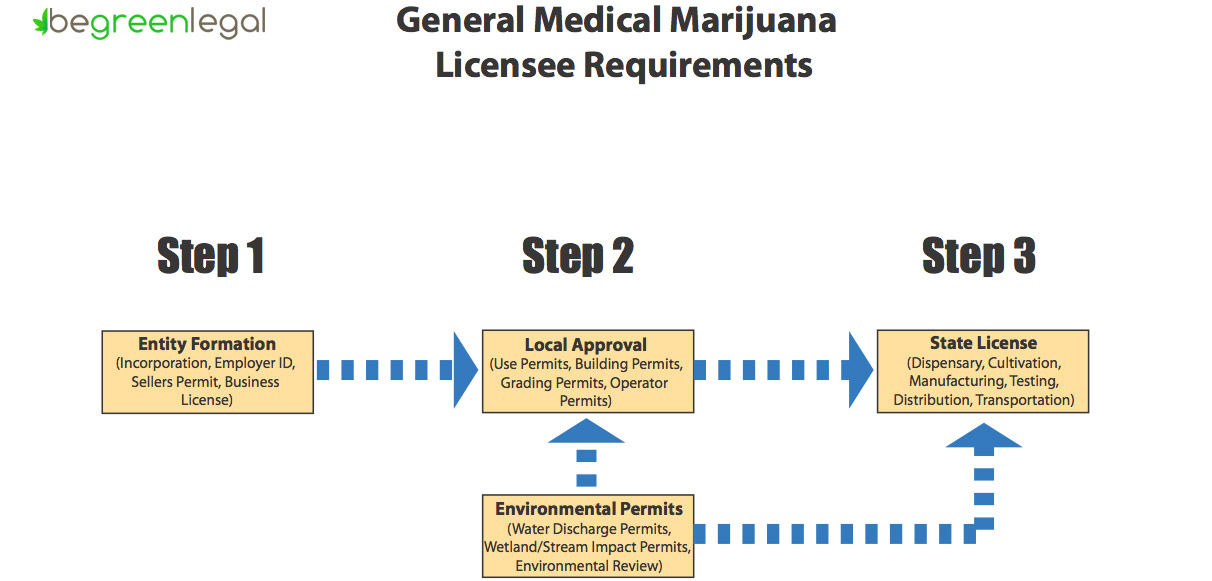How do I start a cannabis business in California, now that it is legal?
Cannabis Business Formation & Licensing Requirements – Part 1
Cannabis businesses have been operating under the regulatory radar in California for decades, resulting in a high degree of sophistication related to cultivation and manufacturing techniques, branding, proliferation of support products and services, and other industry developments. At the same time, these businesses have faced many issues including criminal prosecution, code enforcement violations, limited banking solutions, tax complications, and others. As California ventures into a new chapter with the passage of the Medical Cannabis Regulation and Safety Act (MCRSA) in 2015 and the Adult Use of Marijuana Act (AUMA) in 2016, two things are certain; marijuana is now legal and highly regulated. This new paradigm poses a significant change in how marijuana businesses will operate in the coming years. Existing businesses will need to quickly decide how these changes will affect their operation, with some pursuing full legal compliance and others either continuing to operate illegally or fading into extinction. At the same time, new businesses face the challenge of catching up to sophisticated competition already apparent in the industry. Yet both existing and new marijuana businesses will need to comply with California’s new regulatory system of local and state marijuana licenses and those who start early are likely to have the advantage.
The question we hear often at BeGreenLegal is, “how do I start getting legal?” While the answer depends on your situation and business model, we have outlined a basic, broad-brushed approach that starts with an overview of the licenses and other approvals you may need:
Entity formation – Every business needs an identity to interact with customers, government representatives, tax agencies, banks, and others. At minimum, this identity starts with registration of the business as some form of entity. The most common entity for California cannabis collectives has been the Mutual Benefit Non-Profit Corporation. Although the State has yet to publish regulatory guidance pertaining to the types of entities that will be allowed starting in 2018, for-profit entities such as limited liability corporations (LLC), S-Corps, C-corps, and others may also be possibilities. Additionally, entities will need to possess a federal employer identification number (FEIN), employer registration with the California Economic Development Department (EDD), seller’s permit issued by the California State Board of Equalization, and a local business license.
Local approvals – Marijuana businesses pursuing a license will need to demonstrate that they are in California and that the city or county government in which they are located has approved this location. Local approvals may include permits from the planning and building departments, environmental assessments and permits, and business licenses.
Environmental permits – Whether an environmental permit or similar authorization is needed is largely contingent on the type of business being formed. For example, cultivators, and especially mixed light or outdoor cultivators, will be the most likely business types needing biological and cultural resource assessments, discharge permits regulating runoff, permits for impacting wetlands and other waterways, grading permits, and other approvals from local or state agencies. Other business types engaged in land development will also be required to obtain one or more environmental approvals.
State licenses – California state marijuana licenses are expected to be available starting January, 2018. Licenses will be available for cultivators, manufacturers, dispensaries, distributors, transporters, and testing labs. State agencies issuing these licenses (Department of Consumer Affairs, Department of Food and Agriculture, Department of Public Health) will require compliance with your local government and any applicable environmental permits, as well as a significant amount of information about who owns the business and how you will operate. Consequently, how well businesses prepare now will dictate whether they are one of the first marijuana licensees in the California.
Need help with your Cannabis Business. Call Be Green Legal today.




